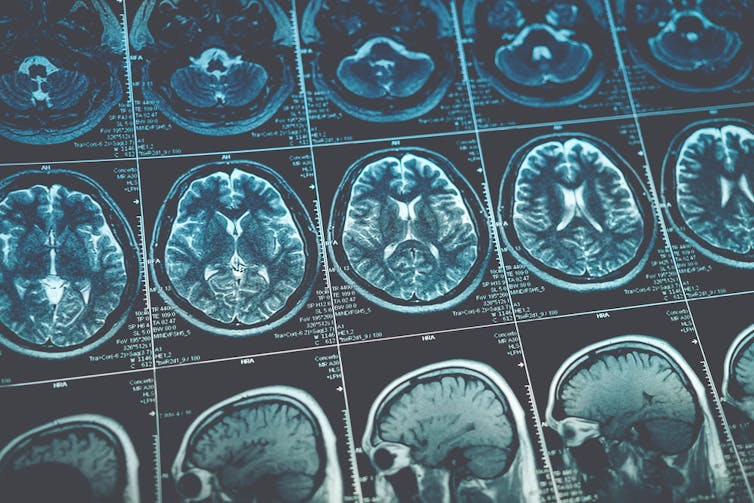Hyejin Kang
Severe COVID results in cognitive impairment similar to that sustained between 50 and 70 years of age and is the equivalent of losing ten IQ points, our latest research shows. The effects are still detectable more than six months after the acute illness, and recovery is, at best, gradual.
There is growing evidence that COVID can cause lasting cognitive and mental health problems, with recovered patients reporting symptoms including fatigue, “brain fog”, problems recalling words, sleep disturbances, anxiety and even post-traumatic stress disorder (PTSD) months after infection.
In the UK, a study found that around one in seven people surveyed reported having symptoms that included cognitive difficulties 12 weeks after a positive COVID test. And a recent brain imaging study found that even mild COVID can cause the brain to shrink. Only 15 of the 401 people in the study had been hospitalised.
Incidental findings from a large citizen-science project (the Great British Intelligence Test) also showed that mild cases can lead to persistent cognitive symptoms. However, these problems appear to increase with the severity of the illness. Indeed, it has been independently shown that between a third and three-quarters of hospitalised patients report suffering cognitive symptoms three to six months later.
The magnitude of these problems, and the mechanisms that are responsible, remain unclear. Even before the pandemic, it was known that a third of people who have an episode of illness that requires ICU admission show objective cognitive deficits six months after admission.
This is thought to be a consequence of the inflammatory response associated with critical illness, and the cognitive deficits seen in COVID could well be a similar phenomenon. Yet there is evidence that SARS-CoV-2, the virus that causes COVID, can infect brain cells. We cannot exclude direct viral infection of the brain.
Other factors, such as hypoxia (low oxygen levels in the blood), may also have a role. It was also unclear whether the pervasive problems with psychological health reported after COVID were part of the same problem as the objective cognitive deficits, or represented a different phenomenon.

DedMityay/Shutterstock
Forty-six patients
To characterise the type and magnitude of these cognitive deficits, and better understand their relationship to disease severity in the acute phase and psychological health problems at later time points, we analysed data from 46 former COVID patients. They had all received in-hospital care, on the ward or ICU, for COVID at Addenbrooke’s Hospital in Cambridge, England.
The participants underwent detailed computerised cognitive tests an average of six months after their acute illness using the Cognitron platform. This assessment platform is designed to precisely measure different aspects of mental faculties such as memory, attention and reasoning and had been used in the above-mentioned citizen science study.
We also measured levels of anxiety, depression and PTSD. The data from the study participants were compared with matched controls – people of the same sex, age and other demographic factors, but who weren’t hospitalised with COVID.
COVID survivors were less accurate and were slower to react than the matched controls. These deficits resolved slowly and were still detectable up to ten months after admission to hospital. The effects scaled with acute disease severity and markers of inflammation. They were strongest for those who required mechanical ventilation, but they were also substantial for those who did not.
By comparing the patients to 66,008 members of the public, we were able to estimate that the magnitude of cognitive loss is similar on average to that sustained with 20 years of ageing, between 50 and 70 years of age. This is equivalent to losing ten IQ points.
The survivors scored particularly poorly on tasks such as “verbal analogical reasoning” (completing analogies such as laces are to shoes what buttons are to …). They also showed slower processing speeds, which aligns with previous observations post-COVID of decreased brain glucose consumption in key brain areas responsible for attention, complex problem-solving and working memory.
While people who have recovered from severe COVID can have a broad spectrum of symptoms of poor mental health – depression, anxiety, post-traumatic stress, low motivation, fatigue, low mood and disturbed sleep – these were not related to the objective cognitive deficits, suggesting different mechanisms.
What are the causes?
Direct viral infection is possible, but unlikely to be a major cause. Instead, it is more likely that a combination of factors contributes, including inadequate oxygen or blood supply to the brain, blockage of large or small blood vessels because of clotting, and microscopic bleeds.
However, emerging evidence suggests that the most important mechanism may be damage caused by the body’s inflammatory response and immune system. Anecdotal evidence from frontline doctors supports this inference that some neurological problems may have become less common since the widespread use of corticosteroids and other drugs that suppress the inflammatory response.
Regardless of the mechanism, our findings have substantial public health implications. Around 40,000 people have been through intensive care with COVID in England alone, and many more will have been admitted to hospital. Many others may not have received hospital treatment despite severe illness due to the pressure on healthcare during peak pandemic waves. This means that there are many people out there who are still experiencing problems with cognition many months later. We urgently need to look at what can be done to help these people. Studies are now underway to address this issue.
However, there is something of a silver lining. If, as we suspect, the picture we see in COVID does indeed replicate the broader problem seen in other types of severe illness, this provides an opportunity to understand the mechanisms responsible and explore treatments.
![]()
Adam Hampshire develops cognitive assessment software for external academic groups. He is funded by the National Institute of Health Research, the Biomedical Research Centre at Imperial College London, and UK Dementia Research Institute Care Research and Technology Centre.
David Menon receives funding from UKRI, Addenbrooke's Charitable Trust, Brain Research Trust, National Institutes of Health (USA), National Institute for Health Research (UK)











